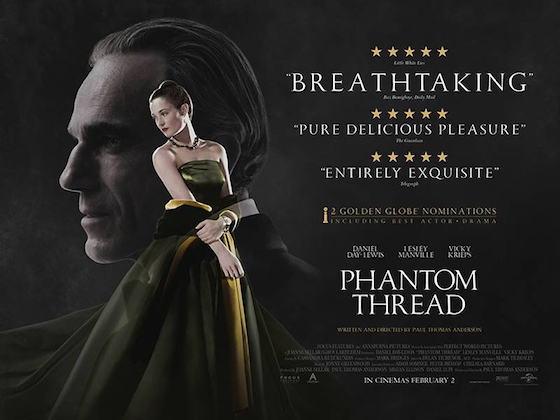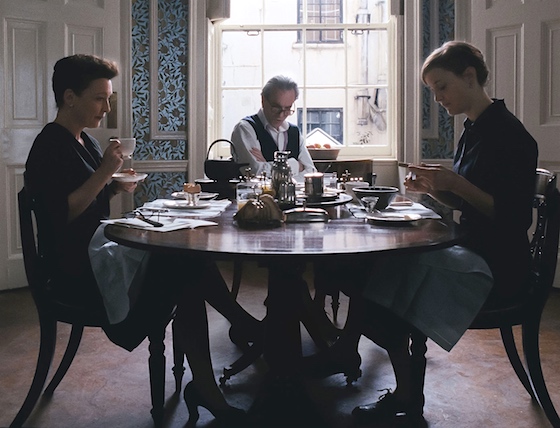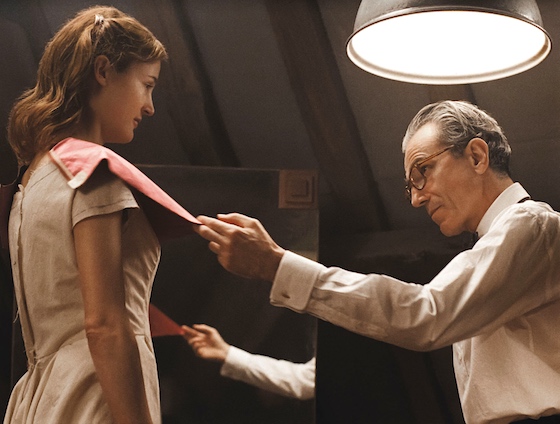Paul Thomas Anderson | 130 mins | 1.85:1 | download (UHD) | USA & UK / English & French | 15 / R

Reynolds Woodcock (Daniel Day-Lewis) is perhaps the most sought-after fashion designer in 1950s London, with a clientele that includes heiresses, countesses, and even princesses. But like many (male) geniuses, he is often prickly, exacting, tempestuous, and cold, and seemingly the only person that can withstand him for any length of time is his equally fastidious business manager — and sister — Cyril (Lesley Manville). Then Reynolds encounters guesthouse waitress Alma (Vicky Krieps) and is immediately smitten, a feeling which she reciprocates, and so she is quickly integrated into his life as his newest live-in muse/lover. Although she initially seems quiet and shy, Alma is actually headstrong and tenacious, and soon the three are locked in a love/hate battle of personalities.
If that sounds melodramatic, there is an element of that to the film; and if Reynolds and Cyril’s brother/sister relationship sounds a bit odd and Gothic, well, there’s an element of that too — and that’s without even mentioning Reynolds’ obsession with his dead mother, or what goes on with some mushrooms. But if there’s one thing writer-director Paul Thomas Anderson’s film is not, it’s histrionic. Its plot may be that of a Gothic melodrama, and if it were a novel perhaps we’d class it as one, but Anderson hasn’t taken on the skin of a Tim Burton or Guillermo del Toro here — in the quiet but forceful and precise way it plays out, Phantom Thread is as stringently produced as one of Reynolds’ gowns.

Similarly, at first glance the film may look as cold as its protagonist can be, taking place in the stark, plain-coloured corridors and rooms of his London home-cum-business, with central characters who seem pragmatic and aloof. It is primarily the arrival of Alma that reveals the truth, however, and while there are sometimes outbursts of emotion, a lot remains restrained, conveyed in glances or calmly-delivered threats. Although Day-Lewis received much of the attention and praise because, well, it’s Daniel Day-Lewis, this film truly derives its power from all three leads. It’s possible to point to scenes or moments where each shine, but the real effectiveness lies in how their characters are built up across the film.
Naturally, some credit for this lies with Anderson’s screenplay (which he reportedly wrote in collaboration with Day-Lewis, saying “he probably should have some kind of co-writing credit.”) There are many fantastic lines and dialogue exchanges — again, this might look like a staid, arty movie from the outside, but it’s alive and vibrant with wit and emotion, even if the former is all delivered very dryly and the latter is often simmering under the surface.
Anderson also deserves much credit for the look of the film. There’s no credited director of photography, because he didn’t hire one, but also because he didn’t claim to fulfil that role himself — according to IMDb, he stated that “he collaborated with and was advised by his camera operators and gaffers, since he does not have the technical expertise of a cinematographer.” The teamwork clearly paid off, because the photography is stunning. Not in a show-off, prettied-up kind of way (though there are still individual shots that are breathtaking, like this one), but just beautiful, crisp photography, which once again reminds us of the magnificence of shooting on 35mm (aided, no doubt, by the fact I watched it in UHD).

All of that remains in service of the characters and their story. I’ve seen it said the film is a dual character study, and I think that’s true. Reynolds and Alma are two very particular individuals, the truth of whose characters is brought out in the way they eventually spark off each other. Their relationship and where it leads is certainly not typical, and may not be healthy, either — indeed, I think how you ultimately react to it may say as much about you and your attitude to relationships as it does the characters. I’ve certainly seen a spread of interpretations expressed online, and (without meaning to sound like I’m above it all) I can understand most of the different perspectives. Of course, being of two minds is a reaction in itself.
I’m more certain of my reaction to the film itself. Put simply, it’s the Paul Thomas Anderson film I’ve felt most engaged by since I saw my first, Magnolia, 15 or so years ago (a feeling which didn’t endure to a rewatch some years later, incidentally). Maybe I owe the rest of his filmography a second chance.

Phantom Thread is available on Sky Cinema from today.
It placed 7th on my list of The 26 Best Films I Saw For the First Time in 2018.

 Contagion
Contagion End of Watch
End of Watch Inherent Vice [
Inherent Vice [ Interstellar [
Interstellar [ Justice League: The New Frontier
Justice League: The New Frontier Life of Pi [
Life of Pi [ Monsters: Dark Continent [
Monsters: Dark Continent [ Seeking a Friend for the End of the World
Seeking a Friend for the End of the World Shallow Grave
Shallow Grave Sherlock Holmes (1922) [
Sherlock Holmes (1922) [ Shivers
Shivers Space Station 76 [
Space Station 76 [ The Story of Film: An Odyssey
The Story of Film: An Odyssey Stranger by the Lake
Stranger by the Lake The Theory of Everything [
The Theory of Everything [ The Thing (2011) [
The Thing (2011) [ Paul Thomas Anderson — the fêted writer-director of
Paul Thomas Anderson — the fêted writer-director of  Anderson chooses to realise the movie mostly in long, unbroken takes, which not only lets the photography shine, but also allows his cast free rein to construct their own performances. I’m not sure how much that pays off, but it’s certainly not a hindrance. Turns from the likes of Josh Brolin and Martin Short border on the memorable, though your mileage will vary on if anyone truly achieves it, with the possible exception of Katherine Waterston, who surely deserves more — and more prominent — roles. Other recognisable faces (Jena Malone, Eric Roberts, Reese Witherspoon) are wasted in one- or two-scene appearances, which I suppose we could kindly call cameos.
Anderson chooses to realise the movie mostly in long, unbroken takes, which not only lets the photography shine, but also allows his cast free rein to construct their own performances. I’m not sure how much that pays off, but it’s certainly not a hindrance. Turns from the likes of Josh Brolin and Martin Short border on the memorable, though your mileage will vary on if anyone truly achieves it, with the possible exception of Katherine Waterston, who surely deserves more — and more prominent — roles. Other recognisable faces (Jena Malone, Eric Roberts, Reese Witherspoon) are wasted in one- or two-scene appearances, which I suppose we could kindly call cameos. I am in neither of those groups, however. The aforementioned fleeting aspects of quality weren’t enough to swing it for me either. Sadly, I’ll be chalking this up alongside
I am in neither of those groups, however. The aforementioned fleeting aspects of quality weren’t enough to swing it for me either. Sadly, I’ll be chalking this up alongside 